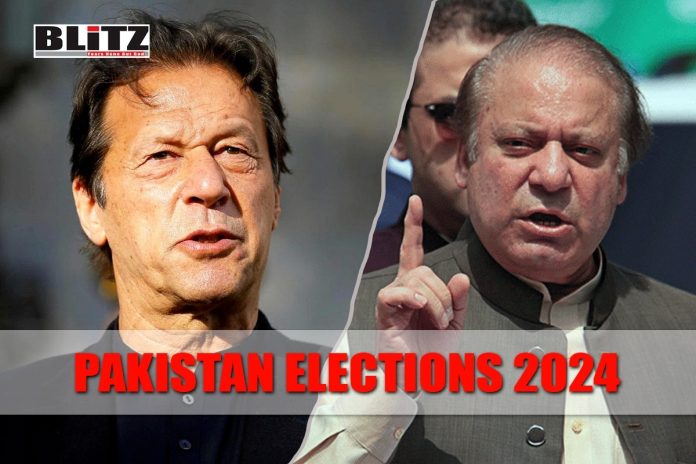Pakistan, a nation entrenched in the complexities of its political landscape, stands at a pivotal moment following the recent general election. The aftermath of the polls has ushered in a period of uncertainty, characterized by a hung verdict and competing claims of victory from major political contenders. As the country grapples with the ramifications of this electoral outcome, the spotlight shifts to the intricate process of coalition-building and government formation, against a backdrop of economic challenges, security threats, and allegations of electoral irregularities.
In the wake of the election, the political arena is abuzz with activity as parties scramble to assert their dominance and carve out a path to power. The Pakistan Muslim League-Nawaz (PML-N), led by three-time former Prime Minister Nawaz Sharif, has emerged as a formidable force, buoyed by its status as the single largest group in the National Assembly. Sharif wasted no time in signaling his intent to form alliances, hinting at a broad-based coalition reminiscent of the Pakistan Democratic Movement (PDM) that governed following Imran Khan’s ouster in 2022. This coalition strategy aims to unite disparate political factions under a common umbrella, leveraging collective strength to seize control of the government.
Conversely, the incumbent Pakistan Tehreek-Insaf (PTI), led by Prime Minister Imran Khan, remains undeterred by legal and personal challenges as it seeks to retain power. Gohar Khan, chairman of the PTI, has reiterated the party’s commitment to upholding its mandate and avoiding what he terms as a “hodgepodge government” formed through compromised alliances. The PTI’s strategy revolves around rallying independent candidates under its banner, a calculated move aimed at consolidating support and enhancing its bargaining power in coalition negotiations.
However, the road to government formation is fraught with obstacles and uncertainties. The delayed announcement of complete election results by the Election Commission has only served to exacerbate tensions and prolong the period of political limbo. With nine seats still undeclared and polling in one constituency postponed due to a candidate’s demise, the specter of uncertainty looms large over the political landscape. Moreover, the emergence of independent candidates as significant players in the electoral process adds a layer of complexity, underscoring the pivotal role of party alignments in securing a majority in parliament.
Amidst these domestic dynamics, the role of the military looms large, casting a shadow of influence over the political sphere. The army chief’s congratulatory message on the “successful conduct” of the election underscores the military’s stake in ensuring stability and continuity in governance. However, allegations of military interference, vehemently denied by the military establishment, continue to fuel suspicions and sow seeds of distrust in the electoral process.
International stakeholders, including the United States, Britain, and the European Union, have voiced concerns about the transparency and fairness of the electoral process. Calls for accountability and scrutiny resonate beyond Pakistan’s borders, underscoring the global significance of the country’s democratic transition.
As the dust settles on the electoral battlefield, analysts foresee two plausible scenarios unfolding in the aftermath of the election. The first scenario envisages a coalition government comprising major political players, with the PTI relegated to the political sidelines. In contrast, the second scenario, though less probable, involves the Pakistan Peoples Party (PPP) joining forces with the PTI to form a government. However, doubts persist regarding the legitimacy of the next government, with allegations of electoral irregularities casting a shadow over Pakistan’s political and economic stability.
Pakistan finds itself at a critical juncture in its political evolution, with coalition negotiations poised to shape the trajectory of governance in the coming days. The challenges are manifold, but amidst the uncertainty lies an opportunity for consensus-building, compromise, and inclusive governance. As political stakeholders navigate the intricacies of coalition-building, the hopes and aspirations of the Pakistani people hang in the balance, awaiting a stable and prosperous future.
UK and US express concerns over Pakistani election
Britain and the United States have both expressed reservations regarding the recent general election in Pakistan. Britain noted “serious concerns” about the electoral process, while the United States emphasized the need for thorough investigations into claims of interference or fraud.
The caretaker Interior Minister, Gohar Ejaz, defended the controversial decision to suspend mobile phone services citing security reasons. He acknowledged the impact this move had on the transmission of election results but underscored the priority of ensuring the safety of citizens.
Meanwhile, amidst the political turbulence, Mohammad Zubair, a street hawker in Lahore, voiced the sentiments of PTI supporters, indicating their refusal to accept a potential victory by the PML-N. Zubair highlighted the success of PTI’s independent candidates despite lacking traditional party symbols or leadership structures.
These statements reflect the heightened tensions and polarization surrounding the election outcome, underscoring the need for transparency and accountability in the electoral process. As Pakistan navigates through this period of uncertainty, international scrutiny and domestic dialogue will play crucial roles in ensuring a fair and democratic transition of power.




